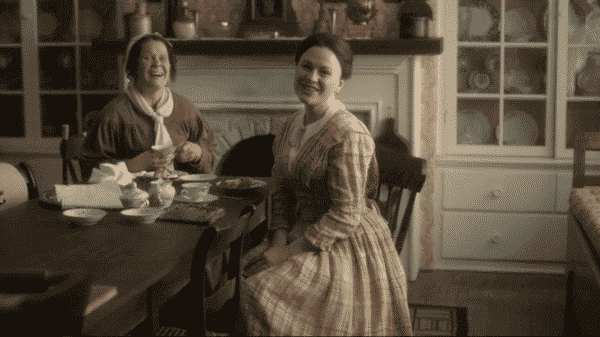Alias Grace: Season 1 – Recap/ Review (with Spoilers)
Alias Grace is a reminder that big and showy performances are by no means needed to get the point across. Sometimes just a bit of coyness, dagger like stares, and a tad bit of mystery is all that is needed for entertaining and award-worthy performances. Summary Grace, an Irish immigrant now in Canada, finds herself,…
![Alias Grace Season 1 Episode 1 Part 1 [Series Premiere] - Sarah Gadon](https://wherever-i-look.com/wp-content/uploads/2017/09/Alias-Grace-Season-1-Episode-1-Part-1-Series-Premiere-2.png)
Spoiler Alert: This summary and review contains spoilers.
Additionally, some images and text may include affiliate links, meaning we may earn a commission or receive products if you make a purchase.
Alias Grace is a reminder that big and showy performances are by no means needed to get the point across. Sometimes just a bit of coyness, dagger like stares, and a tad bit of mystery is all that is needed for entertaining and award-worthy performances.
Summary
Grace, an Irish immigrant now in Canada, finds herself, within weeks, losing her mother, abandoning her father, and at barely 15 to 14 years of age, on her own. Luckily, through a friendship with a girl named Mary, and the acquaintance of a man named Jeremiah, loneliness doesn’t become an issue. What does though is what is seen around her and what others try to, or succeed in doing to her.
Which is why perhaps, locals take pity on her. For despite her being involved in a double murder of her former employer Mr. Kinnear and his head maid Nancy, there is this belief of innocence. If not at least her doing the time and deserving freedom. Which is where Dr. Jordan comes in. He acts as our medium into Grace and we are pushed so deep into his point of view, it is hard to know who she is talking to. Perhaps even, who she might be fooling.
For while Grace may not have a traditional education, she is well learned when it comes to dealing with people. After all, with her being a domestic her whole life, knowing how to adapt to the attitudes and wants of others has become a skill. So how much is embellished, ebbed or omitted is never truly clear. Leaving you wondering, as the show comes to a close, was it only Dr. Jordan she played for a fool?
Collected Quotes
Highlights
Sarah Gadon

Though not featured on Wherever I Look since her role in Indignation, Gadon makes a roaring return to focus. What she does with Margaret Atwood’s work [External], which admittedly I didn’t read, really pushes you to understand why, seemingly one after another, the woman’s work is being adapted. What she does for actresses is like how people sometimes praise Quentin Tarintino [External] or maybe even Woody Allen [External], in terms of writing quality female characters.
Refocusing on Gadon though, like in Indignation, there is this femme fatale quality brought to Grace. Someone who clearly has had a tragic life, but in present day (in terms of the show), she is someone who seems a bit twisted and coy. Throughout the series, there is a need to pinch yourself. To not fall in love with the character and situation because she is doing what she has always done best – manipulate people.
Which, as the hours go on, you come to realize that she may not just be manipulating Dr. Jordan. Though she only looks at us directly once, in the chilling final scene, with the way Dr. Jordan is positioned, it is like she is directly telling us her story. Asking for us to judge if she is guilty, innocent, or maybe justified in her actions. Much less, considering how she was tortured and raped while in an asylum, possibly contains a second personality in her, among other things, if maybe she isn’t as she seems.
All of which Gadon plays in such a masterful way that you know her name will be amongst many other actresses when it comes time for major accolades. For while Indignation surely worked as an introduction to who she is, Alias Grace will work as a silver feather in her cap.
Dr. Jordan’s Cross Examinations
If Grace is lulling us into the belief that she is telling us nothing but the truth, Dr. Jordan bringing up McDermott’s testimony, which makes it seem he and Grace killed Nancy and Mr. Kinnear, is like a finger snap in the face. It brings about this intrigue and helps push Gadon as Grace to feign innocence, be kept on her toes, and keep us from a stupor. Also, Dr. Jordan, in his earlier interactions with Grace, really is the one who initiates this air of mystery about her as he looks into 3rd party perspectives about who she is. Thus really setting up Gadon for the masterful performance she gives.
Mary

Though a minor character in the grand scheme of things, memories of Rebecca Liddiard as Mary live strong. For she plays such a strong part in helping us see Grace as this victim of circumstance. Them being girly and happy together reminds you, despite all that happened before and after, Grace is but a child. Someone who dreams, casually, about maybe finding a husband, maybe a little house, and things of that nature.
But, at the same time, Mary is the one who begins the almost usual traction in Atwood productions which shows, no matter how kind a man, his kindness is dependent on how you go along with his plans. Much less, how you complicate, or try to, his delusions of grandeur and having his cake and eating it too. Thus allowing you to understand how and why Grace learned to play the attention of men as she does.
A Noted Difference Between Boys and Girls, Women and Men
Building off of that, what is also driven is the differences at the time, and present, between men and women. One of the most glaring being that Mr. Kinnear’s case went to trial but the one for the murder of Nancy wasn’t bothered with. A blatant showing that just because she was unmarried, pregnant, her second known pregnancy, and a woman, how much her community valued her.
Though it doesn’t stop there. Even with Grace noting she admires men, but barely ever flirting with them, it seems constantly her, or another woman’s burden, to deal with how men take the attention. One key example is on Grace’s birthday how her being friendly with Jamie, a boy a little younger than her, just sitting in a meadow, and everyone peering on them. That is, alongside speaking to Jeremiah alone in the house.
After those moments, which are completely innocent, she is treated as if she is fast and loose. That is, as opposed to Mr. Kinnear, who people may whisper about for seemingly having a harem, but doesn’t experience the same ostracizing Nancy does.
Low Points
The Fall of Dr. Jordan
For reasons hard to fathom, the hypnotizing of Grace by Jeremiah has a profound effect on Dr. Jordan. He makes it sound as if, when Grace was speaking her truth, perhaps possessed in other people’s opinions, it was a mind shattering revelation. Which, on one hand, he presents an interesting idea. The possibility that under the guise of hypnosis, women can speak freely and without holding their tongue due to worries of their reputation. Yet, on the other hand, after that incident, after being called out by Grace for perhaps being turned on by her stories, or something similar, he decides to screw his landlady.
Then, following that, he heads home. He decides to join the army to deal with the ghost of Grace in his mind and even seems like a mad person after the war. Which isn’t clear if it was because of what he saw during the battle of if Grace’s haunting burrowed so deep into his mind he was stricken dumb and nearly paralyzed in madness.
On The Fence
Nancy
With Anna Paquin playing Nancy, there was some anticipation built up. After all, even if you didn’t love her in True Blood [External], that for her career is like Twilight [External] is for Kristen Stewarts. It may be what she is commonly known for but is by no means a summary of her talents. Yet, I gotta say, while Nancy does add onto the idea of the world of difference between men and women, and the unique survival tactics women had to learn, she is slightly disappointing.
Perhaps because Nancy you almost want to assume is a saint, with the way she is built up. Yet, as we get to know her, see her jealousy and insecurity, she remains a victim but one you are kind of okay with being killed. If only because Grace has seduced you to the point that Nancy’s death leaves you with the feeling of, “She had it coming.”
Overall: Positive (Watch This)
Alias Grace is perhaps one of the few mini-series which, from start to finish, nails it with very little reason for critique. Yes, Nancy may not have popped like you’d assume she was and Dr. Jordan’s end requires some explanation from the writers. However, outside of those two hiccups, those two help Gadon really give us a top-tier performance. The kind which, as said with Indignation [External], leads me to hope we see so much more of her in both the indie and mainstream scene. For, even a week removed from finishing the show, that stare still haunts me.
Has Another Season Been Confirmed?: Nope
Alias Grace, since the beginning, has been touted as a mini-series. Though it could end up like Thirteen Reasons Why and seek to go beyond the source material, currently there isn’t any word from Netflix, nor a push from Margaret Atwood, about doing so.
Episode List
| Episode 1 |
| Alias Grace, similar to Margaret Atwood’s other recent adaptation, The Handmaiden’s Tale, is a show more so about subtle performances than grand drama. So prepare for the adjustment. |
| Episode 2 |
| Mary’s life and death are revealed to us, alongside what maybe Grace’s alibi. |
| Episode 3 |
| We finally get a proper introduction, when it comes to meeting Nancy, and while peculiar, it is hard to not question why she died. |
| Episode 4 |
| As Grace continues to expose her past to Dr. Jordan, so again comes the question of what liberties is she taking in being the only one alive to tell this tale? |
| Episode 5 |
| And so we come upon the day not only Nancy but Mr. Kinnear were murdered. But does Grace tell us the whole story? |
| Episode 6 |
| And so the truth seemingly is revealed but without much shock, fanfare and awe. Yet, despite saying such, there is a satisfying conclusion. |
TV Shows We’re Covering This Season
Images used for editorial and commentary purposes. All rights remain with their respective copyright holders.

![Alias Grace Season 1 Episode 1 Part 1 [Series Premiere]](https://wherever-i-look.com/wp-content/uploads/2017/09/Alias-Grace-Season-1-Episode-1-Part-1-Series-Premiere.png)


![Alias Grace Season 1 Episode 6 Part 6 [Series Finale] - Dr. Jordan](https://wherever-i-look.com/wp-content/uploads/2017/10/Alias-Grace-Season-1-Episode-6-Part-6-Series-Finale-Dr.-Jordan.png)

![Alias Grace Season 1 Episode 6 Part 6 [Series Finale] - Grace Sarah Gadon](https://wherever-i-look.com/wp-content/uploads/2017/10/Alias-Grace-Season-1-Episode-6-Part-6-Series-Finale-Grace-Sarah-Gadon.png)

